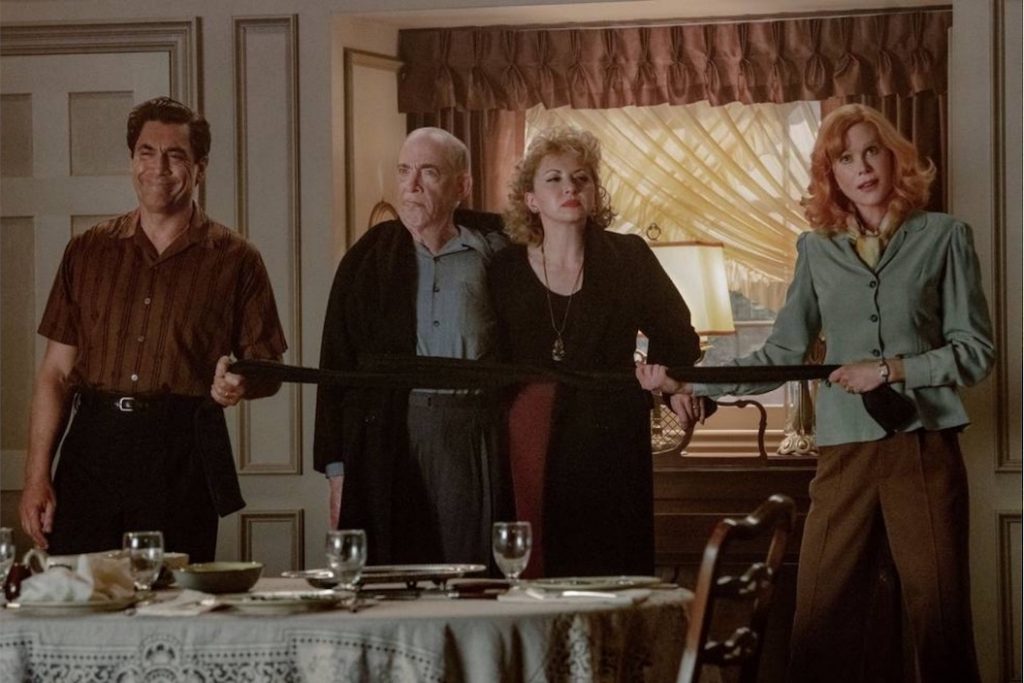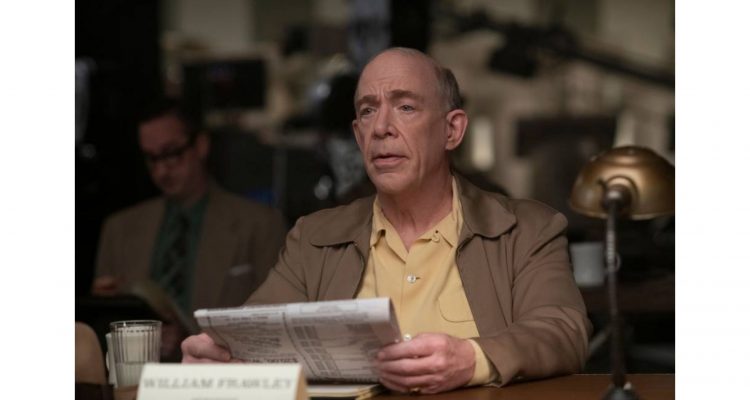With Being the Ricardos, Academy award winner JK Simmons resoundingly returns to the supporting actor Oscar race. A previous winner in the category for his work in Damien Chazelle’s Whiplash, Simmons is now shepherded by Academy award winning screenwriter and director Aaron Sorkin. This marks the pair’s second collaboration following the original Broadway run of A Few Good Men. It’s an experience Simmons shares in his own words during our conversation.
In Amazon Studios’ period film, Simmons pulls double duty as the actor William “Bill” Frawley and his classic I Love Lucy character, Fred Mertz. Simmons is perfectly matched opposite an incredible cast, including Nicole Kidman’s Oscar worthy take on Lucille Ball. His sparring partner throughout the film is Tony winning actress Nina Arianda and the two performers brilliantly bring to life the well-documented feud between Frawley and actress Vivian Vance (Fred Mertz’s much younger wife Ethel in the series).
Simmons expresses both his concern and subsequent appreciation for how it was addressed, “The fact that Aaron could consistently have that be part of the story and not have it just become sort of cringe inducing, is the comedic genius of Aaron Sorkin.”
The original I Love Lucy series ran for 180 episodes, offering a wealth of footage on Frawley’s performance as the navel-level-pants-wearing Fred Mertz. When it came to William “Bill” Frawley the man, no such video existed, requiring Simmons to seek out second hand sources.
“The research I gleaned from other people, like Bill and Vivian despising each other, I think is sometimes more valid when you rely on other people’s perspectives than on somebody’s version of their own life story,” Simmons shares.
Awards Focus spoke to Simmons about all things Ricardos and would also note that his new sports-based film National Champions opened this weekend nationwide.
Awards Focus: Aaron Sorkin recently told a story about running to the theater to see you as Colonel Nathan Jessup in A Few Good Men in the 1990s. Can you talk a bit about your first experience working with his material and going on stage that night?
JK Simmons: As I’ve told many friends, that experience performing as an understudy on Broadway in Aaron’s first play is still a highlight of my career and life. Honestly, maybe still the best work I’ve ever done, and the best marriage of myself and a character.
Aaron, almost a year into the run of his play, was so generous to even show up when somebody said that there was a new understudy going on. The meeting of the minds, hearts and souls that we had backstage afterwards was a major highlight of my life. So, when we found ourselves working together again 30 years later, I was sort of tentative about wanting to bring up that experience because it was so meaningful. When I finally did, and I’m sure his response was more articulate then what I’m about to say, it was something like people talk about you as an actor all the time, and when they tell me they think they know your work, I say, well, you never saw JK Simmons play Lieutenant Colonel Jessup. It might be my favorite story ever to tell about show business.

AF: There’ really no footage of Bill Frawley outside of the character of Fred on I Love Lucy. How did you decide on the direction for the character, and was it something you discussed with Aaron before reading the script?
Simmons: The first thing I do when anything comes across my proverbial desk is just read the script. Start from the beginning, read the whole script, I don’t read any logline or details. With Aaron, I know it’s going to be a brilliantly written script, but I don’t know if I’m going to click with it. I read the script and looking at it now, every character in the script, and I’m talking about number 37 on the call sheet, is so beautifully specific and delineated, and all so eminently actable.
It was kind of a bonus for me out of the four of us to be in the position of playing a guy where there was less about Bill Frawley off camera. I mean, zero footage that I could find. He didn’t have kids, there were no home movies, he didn’t even hang around show business really. So we were all doing our research as meticulously as we could about how to reenact those scenes, the play within the play.
But I did feel a freedom, less of an onus, to recreate something specific in the 95% of the movie when it’s Bill Frawley being Bill Frawley. The research I gleaned from other people, like Bill and Vivian despising each other, was interesting and I think sometimes more valid when you rely on other people’s perspectives than on somebody’s version of their own life story.
AF: The rhythmic comedy of Sorkin has never been better than in this film, can you talk about playing that as well as the elements of the feud with Nina Arianda as Vivian Vance?
Simmons: Any conversation I have about this movie is always going to be a love letter to its writer and director, and in this case also to Nina Arianda who is, to film audiences, the least known of the four of us. But she’s so brilliant as Vivian and as Ethel. The level of the bickering and contentiousness of that relationship is 100% true to life and the research that all of us did.
The fact that Aaron could consistently have that be part of the story and not have it just become sort of cringe inducing, is the comedic genius of Aaron Sorkin. Every second on stage with Nina, throwing barbs at each other, was an absolute joy.
AF: There’s a brilliant scene where Bill takes Lucy across the street from the studio lot to a bar and they have a really meaningful moment that really hits audiences. Was that scene one you and Nicole discussed in depth ahead of shooting?
Simmons: That was one of those things when I read the script… it was the third gift for the character of William Frawley. The first was at the table read scene in the beginning of the film, and the second was the short scene with Desi (Bardem) at the end of the table read where we see them connecting. Unconsciously, I was already looking for a connection with Lucille Ball, and this scene encapsulates so brilliantly the main aspects of that relationship. The crusty, loving uncle and the favorite niece, and the mutual respect there.
AF: The 3AM call when Lucy brings the cast in to workshop the dinner scene brought out many layers to the characters, particularly Bill who is very perceptive about what is bothering her at that moment. The subtle detail there is key for the audience to dial in on. It’s really the subtle detail that defines Frawley in my eyes, even more than the quips.
Simmons: When you’re doing Aaron Sorkin, if you’re reading a scene and don’t see the depth and layers, then you’re missing something and you need to ask some questions. There’s not a sentence or word that isn’t important or revealing about a character. The understanding that Bill has for Lucille, her situation and pressures, is heartwarming and heartbreaking at the same time.
For Nina and myself, who are sitting at the table listening to her give that brilliant speech about that little patch of ground, it goes to the writing. Ninety percent of the movie is Lucille Ball. The only way she’s going to share with both of us what she shares is if she’s drunk, exhausted and vulnerable. There were times for me when it was so moving that it was hard.
Often before I take on a role I like to talk to somebody who has worked with some of the cast before. One thing Miles Teller had said was that there were many times with Nicole Kidman that he would completely stop acting and just stare at her like this adoring audience, and the depth of her portrayal. That workshop scene was one of those where I completely understood what he said and I found myself being moved to tears in a couple of takes.
That’s Bill Frawley, but it was just as much me being affected as an audience.
This article was co-written by Matthew Koss.


